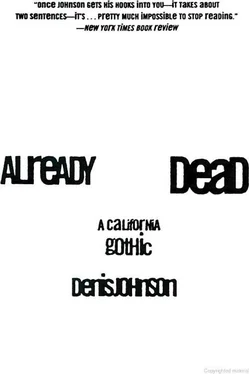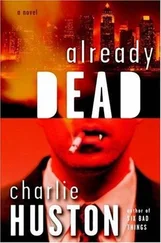Already Dead / 181
They’d probably get around to it, but they hadn’t yet passed a law against coming and going. He could visit two days in Gualala and then head back south. He’d stay up there just long enough to make sure Nelson hadn’t starved the garden, and spend some time down in the woods with Billy; with straight-out, mechanical problems and the tools for solving them. Billy was a healing influence, because he lived entirely out of his own stores. Self-reliance, it went deeper than mere independence — it meant, by Clarence’s reckoning, complete balls-out freedom from any other fucker’s will. People wouldn’t have believed it about him, but Meadows was familiar with Emerson’s essays. He revered them, but he hadn’t read them lately. His stomach lurched when he considered the waste of the last few years.
It was a fact that occasionally something, some vague ripple, surged forward out of the past. And then you were dealing with despair.
Cath, his wife — ex-wife — had given him the Emerson book. He’d been fascinated with her when they’d met, because she read such things and seemed to live in two worlds at once — the world of her life, and the world of books in which she found her life explained. Eventually Meadows had seen that the two worlds came together somewhere inside of her and made for tremendous strength when it came to making large decisions, as, for instance, the decision to turn her back on her husband.
And occasionally what surged forward was panic — what is he doing floating around out here in his life without Cath? Seven good years, two on either side of his thirty-six-month naval tour. A couple terrible months off of some legal problems he’d had in San Luis Obispo, when an indoor pot-growing operation in the valley north of there had turned sour. He’d been accused of murdering his two partners and burning up their bodies in the greenhouse to conceal the crime — groundless charges, brought against him just for the nuisance of the thing, and dropped as soon as he’d bankrupted himself on attorneys. Cath knew he hadn’t done it, but she left him anyway. It had been three years since they’d spoken to each other. He was ashamed right now that he’d let his mind go back to her. He tried to console himself that everybody had at least one. One unforgettable wife. One still-burning flame.
He shut the TV off and waited a few minutes in the dark before going back to the bed and laying himself down, as quietly as he could manage, next to Carrie.
182 / Denis Johnson
He put his hand against the back of her thigh just to feel the warmth.
But she was awake, and as soon as he touched her, said, “ No .” He lay still, paralyzed in a way with solitary embarrassment, and reflected to himself that it wasn’t working with people. So he moved instinctively in the direction of avoiding and silencing them. That’s why he’d taken to travelling to foreign waters, to foreign beaches evoking a seamless sameness underneath all thought, taken to spending his winters in foreign places where the language eluded him.
That was supposed to be bad. You were supposed to find people and connect with them — and that was supposed to be good. But what could be worse than this, right here, tonight?
Yet a weight began to lighten in his heart. He had a feeling this was the last straw. Maybe, just by coincidence, for both of them. Possibly she too was facing with relief the prospect that this absurd game between the sexes had finally tapped itself out.
Maybe he should give it all up. Join a monastery. Or confess one or two things to the cops. Certainly he’d strayed far enough to merit a good long stretch in their custody. In either place he might finally come to value discipline, and then go on to make something of himself.
He’d always hated discipline, but he felt he’d met its essence in certain moments of his military training. Discipline consisted of keeping himself separate from whatever thoughts might be passing through his head.
He needed that detachment now because he seemed to be reacting to the sadness of turning thirty, and still being at zero, with funky spasms and flashes of religious light. He’d set himself up for all this in ways that were now obvious: spending long days alone on this infinite-feeling highway with nothing to do but point the car and sit there and let his head trouble him with riddles, breaking the trip in odd empty places where he sat by the road to watch the desert or farmland drift around him like a sea, stopping off sometimes just south of Gilroy at a Holiday Inn tricked up to duplicate a Spanish mission, complete with a small chapel whose atmosphere worked on him, just as Karl Marx had predicted, like dope. Surfing was also a case in point. What had started out as an adrenaline thrill among teenagers constantly partying had turned into a cycle of lonely vigils in a huge blue medium that sometimes lifted and carried him — in the direction of all the beach parties and the
Already Dead / 183
sandy skin of young girls, yes, who smelled like marijuana and tasted like beer and salt; toward the high times and flickering fires on the beach, yes; but he never seemed to reach them anymore. He’d at first reached them relentlessly, spent the days racing over the ocean and the nights lying under the stars and seducing some of the world’s loveliest seventeen-year-old females. But he was beginning to reinterpret these triumphs in a way that made them look like failures. Only the waiting, never the waves, had been real. And now it seemed that with the hot little girls he’d only engaged in repeated sorrowful transactions, trading their fake lust for his fake affection.
He wouldn’t have bothered to suggest this woman here was any different, not essentially anyway. But she was more grown-up and felt much more real.
He didn’t know what, besides that fact, had made him decide to follow this thing out. It had just been that kind of day, the wind making the ordinary sand harmful, filling the air with pain, and so on. This had the taste of a regular adventure. He takes on the woman and child forever maybe, or they rob him or he gives them all his money.
As he left the next morning, Clarence said to the kid: “You got a Social Security card? No. You’re not a citizen of anywhere yet. You don’t know how rare you are.”
The boy crawled around on the floor looking for one of his new shoes.
Meadows could see it under the couch but didn’t feel like telling him where it was. Carrie sat all dressed up on the bed with her legs tucked under her and her feet, in those red pumps, sticking out sideways, her hands clasped before her, while she looked straight at him and wept.
Not trying to make him pay; just honestly grieving.
He stood in the doorway feeling happy that he wasn’t connected with these two. He could make any gesture he wanted to right now.
He could piss on the floor. Start a fire in the wastebasket.
“Well,” she said, “you fixed my car.”
“I was born to mess with loose connections.”
“Thank you. You saved us.”
“Where do you get your religion?”
“From the road. From the radio. TV sometimes.”
“You’re not a member of a church?”
“The road is a church.”
184 / Denis Johnson
“I guess it is,” Meadows said.
Gassing up at the Big Chief a few minutes later, Meadows watched her across the distance of several hundred yards as she came out of the ground-floor suite and packed up little Clarence and drove her limping Dodge from the parking lot of the Super 8 Motel. Tumbleweed bounced along the pavement beside them. A buzzard’s shadow zipped across their path. It was like that.
Not a half hour later, while the day widened over the interstate, he overtook them in the northbound lanes and thumbed the button on the wheel. But the horn didn’t work. Some sort of short circuit, it wouldn’t be much trouble to fix.
Читать дальше












